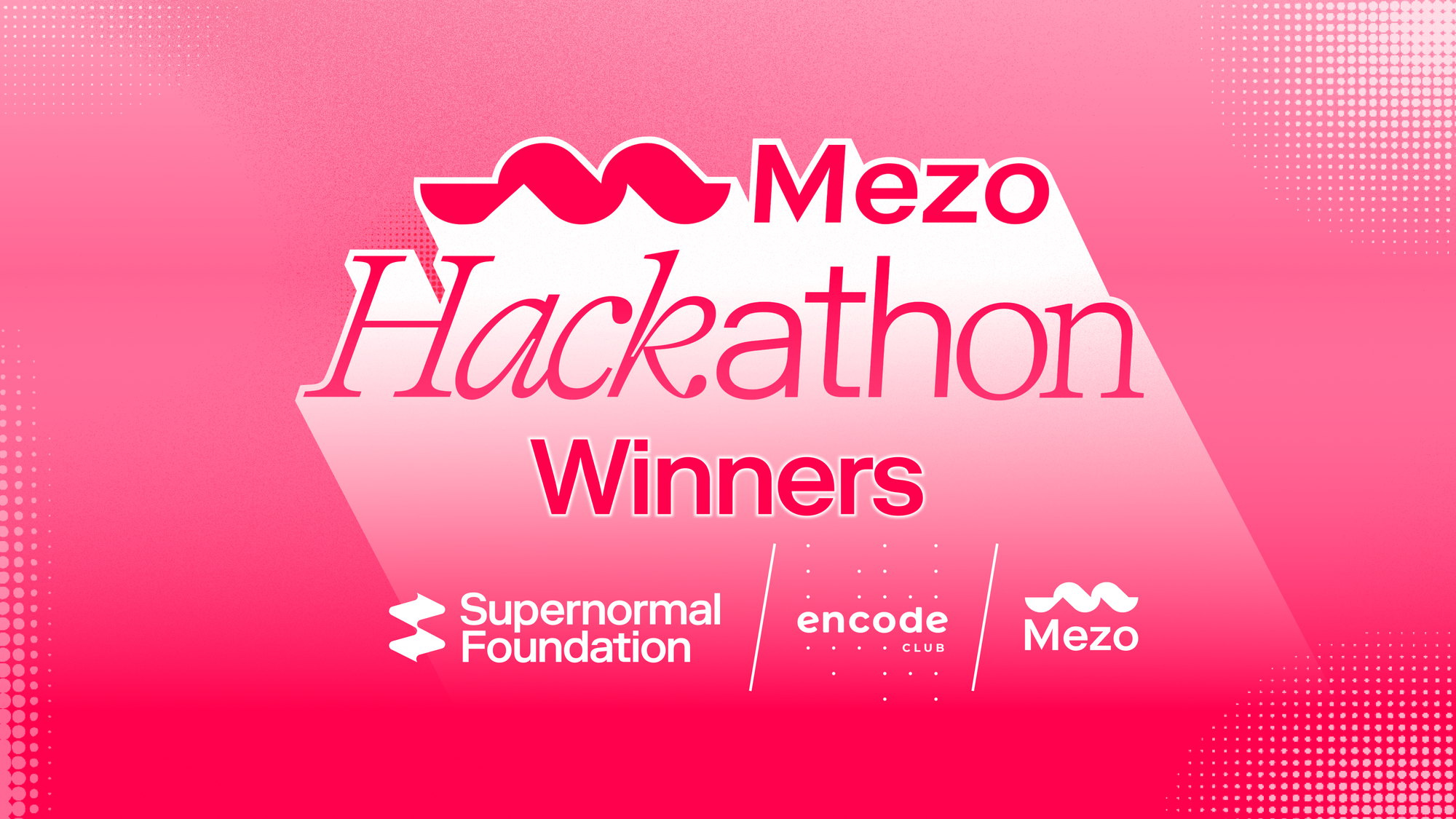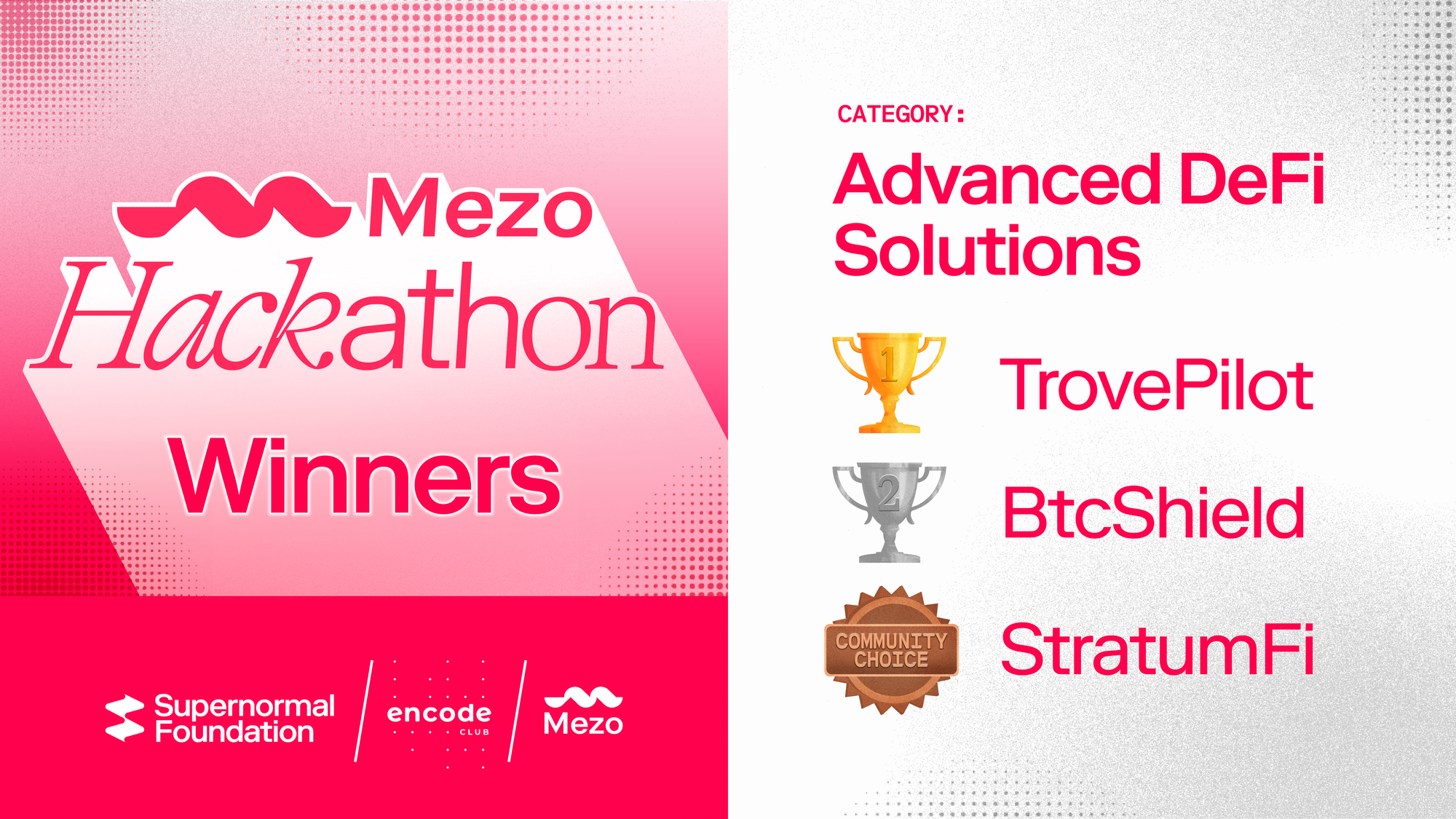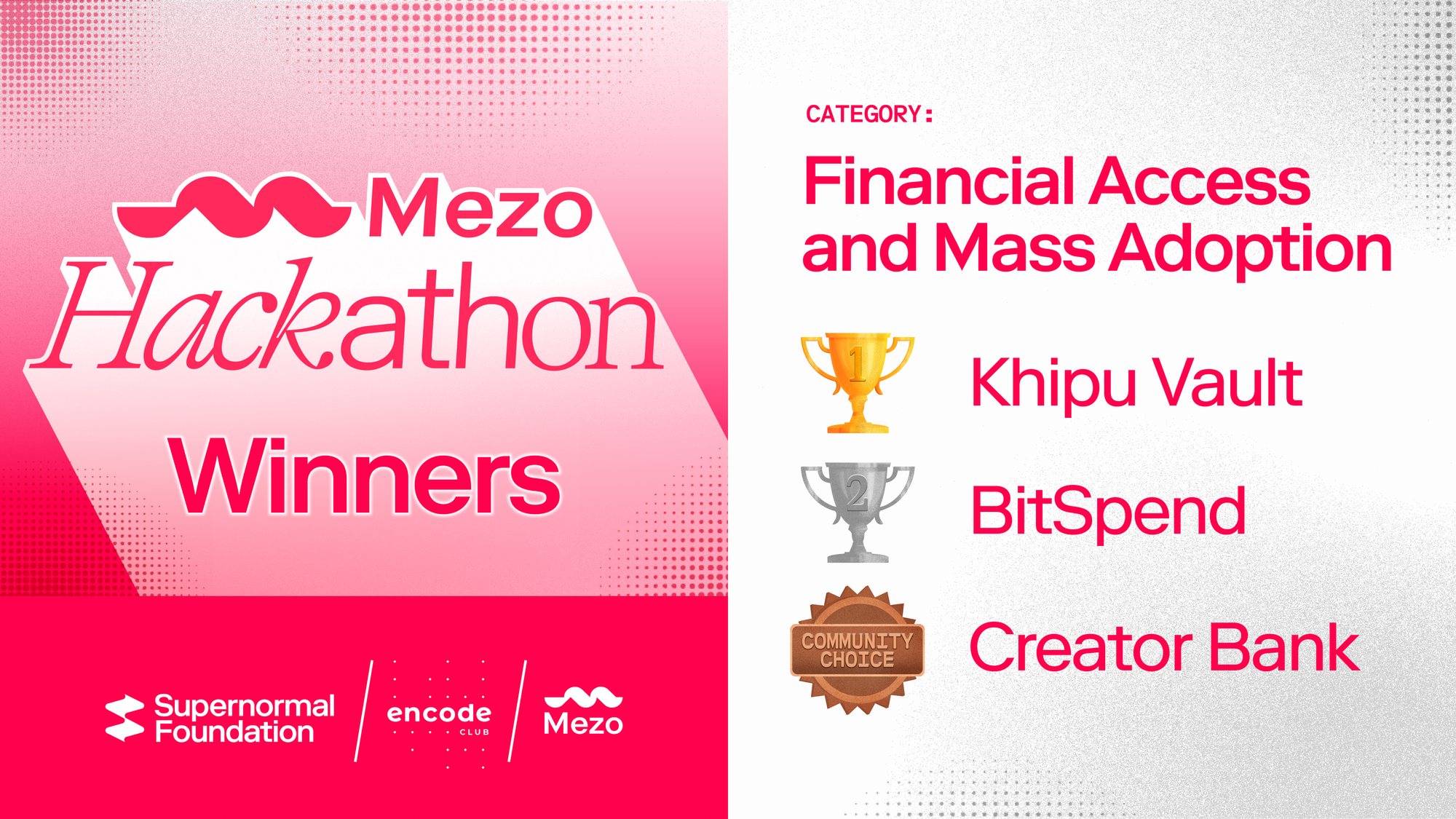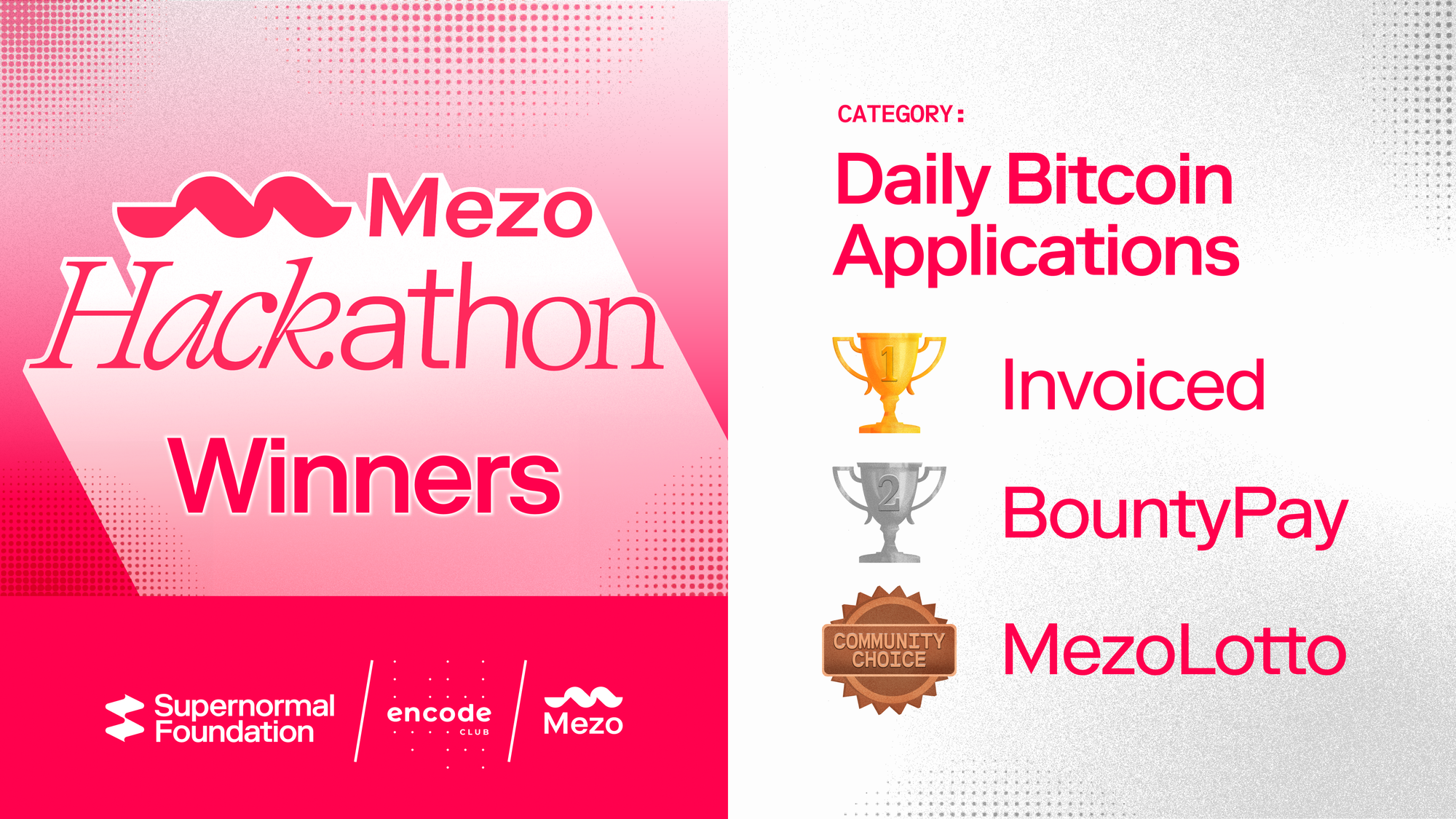Announcing Mezo Hackathon Winners
Mezo Hackathon Results Are In! Nine teams won a total of 37,500 MUSD for groundbreaking projects on Mezo, spanning payments, savings, and advanced DeFi. Highlights include TrovePilot (keeper automation), KhipuVault (LATAM savings), and Invoiced (BTC invoicing with spendable MUSD).

Four weeks ago, we invited builders to use Mezo and ship real products on top of MUSD. The challenge was simple to state and hard to execute.
Today, we are excited to share the results.
Across three tracks, nine teams took home a total of 37,500 MUSD for projects that span infrastructure, payments, savings, and self-repaying loans. Third place in each track came from Community Choice, selected by a committee of community delegates elected on Discord.
The Mezo Hackathon was powered by Supernormal Foundation and Encode (one of our validators), with support from validators Validation Cloud, Spectrum, Boar, and Staking Cabin for mentorship, infra, and RPC access.
Advanced DeFi Solutions Winners
This track focused on teams that treat Mezo as proper market infrastructure: keeper systems, liquidation tooling, structured risk, and yield mechanisms on top of MUSD.

🥇 1st place – TrovePilot: permissionless keeper automation for MUSD
Repo: TrovePilot
Lead: Vitaliy R
What it does
TrovePilot builds a permissionless keeper automation layer on Mezo for core MUSD protocol actions:
- Batch liquidations
- Hinted redemptions
- Yield routing and job coordination
Instead of every team running its own private liquidation bot, TrovePilot moves those workflows into on-chain, modular contracts and exposes them through a small Next.js dashboard.
Keepers submit jobs directly on Mezo. Rewards are forwarded on-chain, with room for protocol fees and a reputation system. Users can pre-fund a VaultManager so keepers can execute small redemptions on their behalf.
Why it matters for Mezo
- Makes peg defense more efficient by turning liquidations and redemptions into transparent jobs that anyone can run.
- Lowers infra and dev overhead for community keepers and bots.
- Creates a base layer other protocols can rely on when they design yield strategies, structured products, or more complex MUSD flows.
🥈 2nd place – BTCShield: option-style protection for unhealthy positions
Repo: BTCShield
Lead: Manan Singhal
What it does
The protocol lets a borrower flag an unhealthy position and open it to outside supporters. A supporter sends extra collateral into that position and, in return, receives an option to take over the entire vault later. The size of the premium is calculated from expected liquidation loss plus a safety margin, divided by collateral, so that the option terms track the actual risk in the system.
Once the agreement is live, several paths exist. At maturity, the supporter can exercise the option and acquire the vault, or default and forfeit the premium that was added as collateral. The borrower can terminate the arrangement early by repaying premium plus protocol fees and restoring full control. If the supporter does not act within a short grace period after maturity, the option expires, and the premium is treated as a loss.
Why it matters for Mezo
- Converts liquidation from a pure penalty into a market for support, where outside capital can temporarily stabilize stressed positions.
- Gives DeFi natives a way to earn from defending positions instead of front-running them.
- Opens up structured products on Mezo that look closer to option-based insurance than basic stop-loss bots.
🏆 Community Choice – StratumFi: self-repaying loans for “lazy Bitcoin”
Repo: StratumFi
Lead: Ademola Adebowale
Chosen by community delegates, StratumFi brings Alchemix-style self-repaying loans to Bitcoin on Mezo.
How it works
- A user deposits BTC into a StratumFi vault.
- The protocol pairs that BTC with protocol-owned MUSD and provides liquidity to a MUSD/BTC pool on Tigris.
- The LP position earns trading fees.
- The user mints bMUSD, a synthetic stablecoin pegged 1:1 to MUSD, against their position.
- A Harvester contract routes fees to pay down the user’s bMUSD debt over time.
The result: users can spend bMUSD today while their own yield repays the loan.
Why it matters for Mezo
- Positions MUSD as the base liquidity and unit of account for a self-repaying loan primitive.
- Targets advanced DeFi users and long-term Bitcoin holders who want capital efficiency without constant liquidation risk.
- Treats bMUSD as a composable “money lego” for other Mezo protocols.
Financial Access & Mass Adoption Winners
This track focused on turning Mezo and MUSD into tools for people who live far from crypto Twitter but very close to inflation and payment friction.

🥇KhipuVault: cooperative Bitcoin savings for Latin America
1st place – KhipuVault: cooperative Bitcoin savings for Latin America
Repo: KhipuVault
Team: AndeLabs
KhipuVault is built by AndeLabs, a Latin American team active in Asoblockchain and Cochablock. The goal is to give users in high-inflation countries a Bitcoin-backed savings product that feels like a modern fintech app.
How it works
- Users deposit BTC.
- The system routes into MUSD on Mezo.
- MUSD goes into one of three smart contract pools:
- Individual savings
- Cooperative community pools
- Prize pools for savings-linked rewards
The interface hides DeFi plumbing and presents balances, yield, and contributions in a way that looks closer to a digital bank than a protocol dashboard.
Why it matters for Mezo
- Targets real users in Bolivia, Argentina, Venezuela and similar markets where local currencies lose value quickly.
- Uses MUSD as an inflation-resistant savings asset while preserving Bitcoin security.
- Shows that cooperative savings circles and prize pools can live on Mezo rather than in spreadsheets and messaging groups.
🥈2nd place – BitSpend: self-custodial NFC cards for MUSD payments
Repo: BitSpend
Lead: Jay Shitre
BitSpend brings MUSD into tap-to-pay form while keeping users in control of their keys.
How it works
- When a user registers a card, BitSpend generates a wallet and splits the private key into three shares using Shamir’s Secret Sharing:
- One encrypted in the backend database
- One on the NFC card
- One derived from the user’s PIN
- To pay, the user taps the card and enters the PIN.
- The system reconstructs the key in memory, signs the MUSD payment, and then wipes the key.
Additional features include daily spending limits, gas automation for card wallets, and a merchant-friendly POS experience using a phone.
Why it matters for Mezo
- Uses MUSD as a stable payment asset that can move in a few seconds with Bitcoin security.
- Preserves self-custody through multi-party key reconstruction instead of custodial cards.
- Gives small merchants and crypto the “tap a card that spends from my MUSD balance on Mezo” feel.
🏆 Community Choice – CreatorBank: a money app for creators on Mezo
Repo: CreatorBank
Lead: Jade Laurence Empleo
CreatorBank builds a Mezo-native toolkit for creators and communities, with everything settling in MUSD:
- Tips and one-off payments
- Subscription memberships
- Invoices and pay links
- Revenue splits for collaborators
Users connect with Mezo Passport, create communities, set up membership passes, and manage payouts. Memberships use ERC-1155 tokens. Invoices and paylinks are on-chain with Pyth-based price stamping for receipts.
Why it matters for Mezo
- Makes MUSD a default unit for creator income and recurring payments.
- Replaces platform-locked payouts with direct settlement to a Mezo wallet.
- Provides a base for future features like goal-based savings, analytics, and integrations with email or CRM tools.
Daily Bitcoin Applications Winners
This track rewarded products that show Bitcoin-backed finance in normal workflows: invoices, bounties, savings, and everyday cashflow.

🥇 1st place – Invoiced: Bitcoin invoicing that mints spendable MUSD
Reoi: Invoiced
Leads: Janice Gathoga, Tevin Isaac
Invoiced targets freelancers who want payment in Bitcoin but also need stable money for rent, food, and expenses.End-to-end flow
- A freelancer creates an invoice in USD.
- The app displays the BTC equivalent and generates a unique code and QR link.
- The client pays in BTC.
- The BTC flows into a Mezo vault as collateral.
- The vault mints mUSD (up to a configured LTV) at Mezo’s fixed 1% rate.
- The freelancer withdraws or spends mUSD through payout rails.
- When ready, the freelancer repays and unlocks the original BTC.
Invoices are linked to Mezo transaction addresses and synced via the Boar Network WebSocket for live status updates.
Why it matters for Mezo
- Turns the “hold or spend” dilemma into a workflow: receive BTC, borrow mUSD against it, stay liquid, and keep long-term exposure.
- Aligns tightly with Financial Access & Mass Adoption by making Bitcoin payments usable for design, engineering, and remote work across borders.
- Uses Mezo’s vaults, mUSD minting, and Boar infrastructure in a way that can extend to agencies, platforms, and marketplaces.
🥈 2nd place – BountyPay: MUSD payouts wired into GitHub
Repo: BountyPay
Lead: LucciLabs
BountyPay connects GitHub issues to automatic MUSD payouts on Mezo.
How it works
- A maintainer installs the BountyPay GitHub App.
- On any issue, they click "Attach bounty" and fund an escrow contract with MUSD on Mezo.
- A contributor opens a PR that references the issue and includes their wallet.
- When the PR merges, the contract releases MUSD from escrow to the contributor.
- Both sides receive on-chain receipts.
Everything happens in the developer’s usual workflow, with Mezo handling settlement.
Why it matters for Mezo
- Uses MUSD as the payout currency for open-source work, with Bitcoin-backed security and global reach.
- Creates a trust-minimized bridge between GitHub events and Mezo transactions.
- Helps maintainers in any region fund and pay contributors without banking friction.
🏆Community Choice – MezoLotto: prize-linked savings for MUSD
Repo: MezoLotto
Lead: Aditya Bhansali and @allenjosephaj
MezoLotto brings no-loss lottery savings to MUSD.
How it works
- Users deposit MUSD into a shared savings pool.
- Deposits generate entries: 1 MUSD equals 1 ticket.
- Pooled capital earns yield that accumulates as the prize pool.
- At draw time, a winner is selected from the depositors.
- The winner receives the yield.
- Non-winners keep their full principal and can withdraw.
The contracts are deployed on Mezo testnet and use adapters for randomness during development.
Why it matters for Mezo
- Gives Bitcoin holders an intuitive way to put MUSD to work without reading DeFi docs.
- Uses prize-linked mechanics to turn savings into an engaging habit instead of a passive balance.
- Sets up a pathway to plug Mezo pools and LP yields into a consumer-facing experience.
What this wave of projects says about Mezo
Across all nine winners, a pattern appears.
MUSD is treated as the settlement currency for bounties and invoices, the unit of account for creator tools, the deposit asset in savings and lottery products, and the core leg in structured DeFi strategies like self-repaying loans.
Another pattern is that infrastructure and UX are progressing simultaneously. On the infrastructure side, projects like TrovePilot, BTCShield, and BountyPay take on keepers, liquidation, and trust minimised payouts. On the UX side, KhipuVault, BitSpend, CreatorBank, Invoiced, and MezoLotto focus on saving, spending, and earning in flows that regular users recognise.
Every project here addresses a real problem and extends the capabilities of Bitcoin. That's the point of Mezo: turn the world's hardest, most trusted money into financial infrastructure that actually works for daily life.
Congrats to all the winners and everyone who shipped during the hackathon. This is just the beginning.
Interested in building on Mezo? Check out the developer docs and join the Discord.
